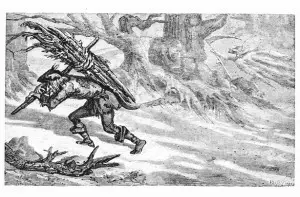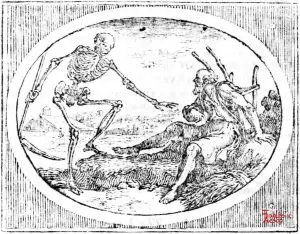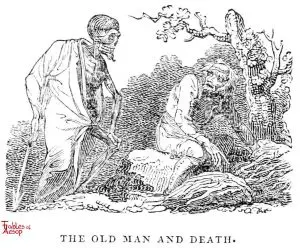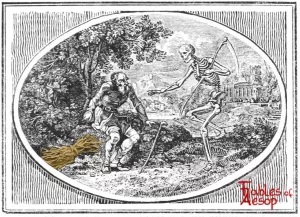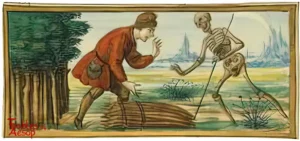An Old Man was tired of picking up sticks and called on Death to take him. Death arrived and the Old Man asked him to pick up the sticks. Changed his mind.
Be careful what you wish for.

Eliot/Jacobs Version
An Old Man, bent double with age and toil, was gathering sticks in a forest. At last he grew so tired and hopeless that he threw down the bundle of sticks, and cried out: “I cannot bear this life any longer. Death come and take me!” As he spoke, Death appeared and said to him: “What do you want Old Man? I heard you call me.” “Please, sir,” replied the Old Man, “would you kindly help me lift this load of sticks on to my shoulder?”

JBR Collection
A poor and toil-worn Peasant, bent with years, and groaning beneath the weight of a heavy faggot of firewood which he carried, sought, weary and sore-footed on a long and dusty road, to gain his distant cottage. Unable to bear the weight of his burden any longer, he let it fall by the roadside, and sitting down upon it, lamented his hard fate. What pleasure had he known since first he drew breath in this sad world? From dawn to dusk one round of ill-requited toil! At home, empty cupboards, a discontented wife, and disobedient children! He called on Death to free him from his troubles. At once the King of Terrors stood before him, and asked him what he wanted. Awed at the ghastly presence, the Old Fellow stammering said, it was nothing more than to have helped once more upon his shoulders the bundle of sticks which he had let fall.

Townsend version
An old man was employed in cutting wood in the forest, and, in carrying the faggots to the city for sale one day, became very wearied with his long journey. He sat down by the wayside, and throwing down his load, besought “Death” to come. “Death” immediately appeared in answer to his summons and asked for what reason he had called him. The Old Man hurriedly replied, “That, lifting up the load, you may place it again upon my shoulders.”

Samuel Croxall
A POOR feeble old Man, who had crawled out into a neighbouring wood to gather a few sticks, had made up his bundle, and laying it over his shoulders, was trudging homeward with it; but, what with age, and the length of the way, and the weight of his burden, he grew so faint and weak, that he sunk under it; and, as he sat on the ground, called upon Death to come, once for all, and ease him of his troubles. Death no sooner heard him, but he came and demanded of him what he wanted. The poor old creature, who little thought Death had been so near, and frighted almost out of his senses with his terrible aspect, answered him trembling, That having by chance let his bundle of sticks fall, and being too infirm to get it up himself, he had made bold to call upon him to help him; that indeed this was all he wanted at present; and that he hoped his worship was not offended with him for the liberty he had taken in so doing.
THE APPLICATION
This fable gives us a lively representation of the general behaviour of mankind towards that grim king oi terrors, Death. Such liberties do they take with him behind his back, that upon every little cross accident which happens in their way, Death is immediately called upon; and they even wish it might be lawful for them to finish by their own hands a life so odious, so perpetually tormenting and vexatious. When, let but Death only offer to make his appearance, and the very sense of his near approach almost does the business: Oh, then all they want is a little longer life; and they would be glad to come off so well as to have their old burden laid upon their shoulders again. One may well conclude what an utter aversion they, who are in youth, health, and vigour of body, have to dying, when age, poverty, and wretchedness, are not sufficient to reconcile us to the thought.

Thomas Bewick (The Old Man and Death)
A poor feeble old Man, who had crawled from his cottage into a neighbouring wood to gather a few sticks, had made up his bundle, and laying it over his shoulders, was trudging homewards; but what with age, and the length of the way, he grew so faint and weak, that he sunk under it, and as he sat upon the ground, called upon Death to come once for all and ease him of his troubles. Death no sooner heard him, than he came and demanded what he wanted? The poor old Creature, who little thought Death was so near, frightened almost out of his senses with his terrible aspect, answered him trembling, That having by chance let his bundle of sticks fall, and being too infirm to get it up himself, he had made bold to call upon him to help him; and he hoped his worship was not offended with him for the liberty he had taken in craving his assistance.
APPLICATION.
This Fable gives us a lively representation of the general behaviour of mankind towards that grim king of terrors, Death. Such liberties do they take with him behind his back, that upon every little accident which happens in their way, Death is immediately called upon, and they even wish it might be lawful for them to finish with their own hands a life so odious, so perpetually tormenting, and vexatious. When, let but Death make his appearance, and the very sense of his near approach almost does the business: then it is that they change their minds, and would be glad to come off so well as to have their old burthen laid upon their shoulders again. But wise and good men know that care and numberless disappointments must be their portion in their passage through life, and know also that it is their duty to endure them with patience; for he is the best and happiest man who neither wishes nor fears the approach of Death.
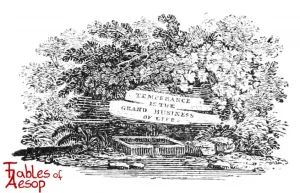

L’Estrange version
An old man that had travell’d a great way under a huge burden of sticks, found himself so weary, that he cast it down, and call’d upon Death to deliver him from a more miserable life. Death came presently at his call, and asked him his bus’ness. Pray good sir, says he, do me but the favour to help me up with my burden again.
Moral
Men call upon death, as they do upon the devil: when he comes they’re afraid of him.

Gherardo Image from 1480

Mors et Pauper
Pauper quidam lignorum fasciculum portabat humeris. Longo deinde itinere fatigatus, onere se levavit, consedit humi, et flebili voce advocavit Mortem. Illa continuo adest, interrogans quid se velit. Respondet pauper, “Humi ut tolleres hunc fascem mihi, huc ego te vocavi.”
Moral
Adeo in miseris etiam vitae amantes sunt mortales.
Perry #60
